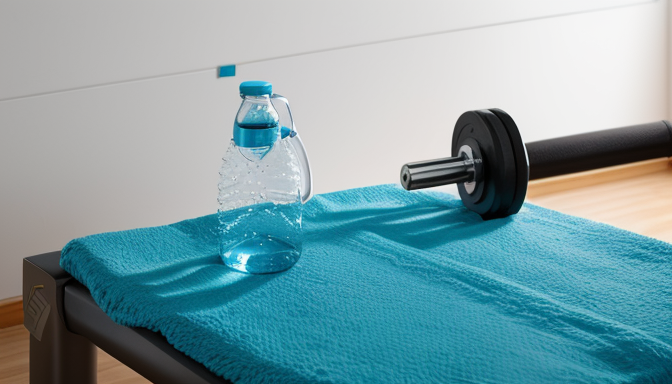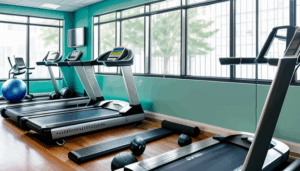When it comes to maximizing your workout performance, hydration is your unsung hero. Imagine trying to run a marathon with a flat tire—your performance would plummet, right? Well, that’s exactly what dehydration does to your body during exercise. Staying hydrated isn’t just about quenching your thirst; it’s about fueling your body for optimal performance.
Hydration plays a crucial role in several aspects of your workout, including endurance, strength, and recovery. When your body is well-hydrated, it can maintain its temperature more efficiently, allowing you to push harder and longer. Think of your muscles as sponges; when they’re well-hydrated, they can expand and contract effectively, giving you the strength you need to lift those weights or sprint that extra mile.
Moreover, hydration affects your cognitive function. Ever tried to concentrate on a task while feeling parched? It’s tough! Dehydration can lead to a decline in mental clarity, making it harder to focus on your workout. This is especially critical during high-intensity training, where every second counts. You want to be sharp and ready to respond, not distracted by a dry mouth or fatigue.
So, how do you ensure you’re adequately hydrated? It’s not just about gulping water before hitting the gym. You need to develop a hydration strategy that includes:
- Drinking water consistently throughout the day.
- Incorporating electrolyte-rich beverages during intense workouts.
- Monitoring your urine color as a hydration gauge—clear is good!
In summary, keeping your body hydrated is essential for achieving peak performance. Whether you’re an athlete or just someone who loves to stay active, remember that hydration is a key player in your fitness game. So grab that water bottle and make hydration a priority!
The Importance of Hydration
When it comes to maximizing workout performance, hydration is often the unsung hero. Imagine your body as a finely tuned machine; without the right fuel, it simply won’t operate at peak efficiency. Hydration is crucial for athletes and fitness enthusiasts alike, as it directly impacts endurance, strength, and overall health. Staying hydrated helps maintain optimal physical performance and prevents the dreaded pitfalls of dehydration that can derail even the most dedicated workout plans.
Why is hydration so important, you ask? Well, water makes up about 60% of our body weight, and it plays a vital role in various bodily functions. It helps regulate body temperature, lubricates joints, and transports nutrients to cells. Without adequate hydration, you might find yourself feeling sluggish and fatigued, which can severely hinder your ability to push through that final set or sprint to the finish line.
In fact, research shows that even a 2% drop in body weight due to dehydration can lead to decreased performance. This is particularly critical for athletes engaged in prolonged activities. To help you grasp the significance of hydration, consider these essential points:
- Enhances Endurance: Staying hydrated allows your body to perform optimally over longer periods.
- Improves Strength: Proper hydration supports muscle function, allowing you to lift heavier and train harder.
- Facilitates Recovery: Hydration aids in muscle recovery post-workout, reducing soreness and fatigue.
In summary, the importance of hydration cannot be overstated. It’s not just about quenching your thirst; it’s about fueling your body for success. So, the next time you lace up your sneakers, remember: a well-hydrated athlete is a powerful athlete!

Effects of Dehydration on Performance
Have you ever felt that sluggishness during a workout? It might not just be fatigue; it could be dehydration creeping in. Even mild dehydration can wreak havoc on your physical performance. When your body lacks adequate fluids, it struggles to maintain optimal function, which can lead to a significant drop in both strength and endurance. Imagine trying to run a marathon with a flat tire—your performance is bound to suffer!
Studies show that losing just 2% of your body weight in fluids can impair your performance. This might not sound like much, but it can lead to a noticeable decline in your ability to push through those last few reps or sprint to the finish line. Not only does dehydration affect your muscles, but it also impacts your cognitive function. You might find it hard to concentrate, which can result in poor decision-making during high-stakes moments in your workout.
Here are some common effects of dehydration on your performance:
- Decreased Strength: Without enough fluids, your muscles can’t contract effectively, leading to a drop in strength.
- Reduced Endurance: Dehydration can cause fatigue to set in quicker, making it tough to keep going.
- Cognitive Impairment: A lack of hydration can lead to confusion and decreased coordination, which is critical for athletes.
In essence, staying hydrated is not just about quenching your thirst; it’s about maintaining peak performance. Think of hydration as the oil in your car’s engine—without it, everything grinds to a halt. So, next time you hit the gym or go for a run, remember that your water bottle is your best workout buddy!
Signs of Dehydration
Recognizing the early signs of dehydration is essential for anyone engaged in physical activity. Just like a car running low on fuel, your body can’t perform at its best without adequate hydration. When you’re not drinking enough water, your body starts sending out signals that something is off. Ignoring these signs can lead to a decline in performance and even serious health issues.
Physical symptoms are often the most noticeable. If you find yourself feeling unusually fatigued or experiencing dizziness, it might be time to check your hydration levels. Muscle cramps can also be a red flag; they’re your body’s way of saying, “Hey, I need more fluids!” Here’s a quick rundown of physical symptoms to keep an eye on:
- Fatigue: Feeling unusually tired can be a sign of dehydration.
- Dizziness: Light-headedness during workouts can indicate a lack of fluids.
- Muscle Cramps: Sudden cramps may point to insufficient hydration.
But it’s not just your body that suffers; cognitive symptoms can sneak up on you too. Have you ever tried to focus on a workout only to realize your mind is wandering? Dehydration can lead to decreased focus and coordination, making it harder to execute even the simplest exercises. If you find yourself struggling to concentrate or feeling a bit off-balance, it’s crucial to hydrate. Remember, your brain needs water just as much as your muscles do!
In summary, staying aware of these signs is key to maintaining your performance and health. Hydration isn’t just about quenching your thirst; it’s about keeping your body and mind in peak condition. So, the next time you hit the gym, make sure you’re not just sweating it out—make sure you’re drinking it in!
Physical Symptoms
When it comes to hydration, your body is like a well-oiled machine; every part needs to function smoothly for optimal performance. If you’re not drinking enough water, you might start to notice some that can put a damper on your workout. Imagine trying to run a car on empty—eventually, it just won’t go. Similarly, dehydration can lead to a range of unpleasant physical effects that can hinder your exercise routine.
One of the first signs you might feel is fatigue. Imagine hitting the gym, feeling pumped, and suddenly, you feel like a deflated balloon. That’s dehydration creeping in, stealing your energy. Alongside fatigue, you may also experience dizziness. This isn’t just a minor inconvenience; it can seriously affect your balance and coordination, making even simple movements feel like a challenge. Muscle cramps are another common symptom. Picture your muscles tightening up, making it difficult to complete that last set of squats or run those final laps. These cramps can be sharp and painful, reminding you that your body is in desperate need of hydration.
It’s essential to recognize these symptoms early on. Ignoring them can lead to more severe issues, such as heat exhaustion or heat stroke. So, if you find yourself feeling fatigued, dizzy, or experiencing muscle cramps, it’s time to grab that water bottle and rehydrate. Remember, staying hydrated isn’t just about quenching your thirst; it’s about keeping your body in peak condition so you can crush your fitness goals!
Cognitive Symptoms
When it comes to hydration, many people focus solely on the physical aspects, but let’s not forget about our mental performance. Dehydration doesn’t just leave you feeling sluggish; it can also play tricks on your brain. Imagine trying to solve a puzzle while someone is slowly turning down the lights. That’s what dehydration does to your cognitive functions!
Even mild dehydration can lead to a range of cognitive symptoms that can derail your workout and daily activities. You might find yourself struggling to concentrate, your memory may feel foggy, and coordination could take a hit. It’s like trying to run a race with your shoelaces tied together—frustrating and counterproductive!
Here are some common cognitive symptoms to watch for:
- Decreased Focus: You might notice that your mind wanders during workouts or when you’re trying to complete tasks.
- Poor Coordination: Simple movements may feel clumsy or uncoordinated, increasing the risk of injury.
- Memory Lapses: You may struggle to recall important information or instructions, making your workout less effective.
Understanding these cognitive symptoms is crucial for athletes. If you’re feeling mentally off, it could be a sign that you need to hydrate. Remember, your brain is about 75% water, and keeping it hydrated is essential for maintaining that sharp edge. So, before you hit the gym, make sure you’re not just filling your water bottle, but also filling your mind with the clarity it needs to perform at its best!
Hydration Strategies
When it comes to enhancing your workout performance, are your secret weapon. Imagine your body as a well-oiled machine; without the right amount of fuel, it simply won’t run smoothly. So, how can you ensure you’re fueling your body properly? Here are some effective hydration strategies that can make a world of difference.
First off, it’s crucial to start your day with a glass of water. This simple act can kickstart your hydration levels before you even step into the gym. But don’t stop there! As you prepare for your workout, aim to drink at least 16-20 ounces of water about an hour before you exercise. This pre-hydration can significantly boost your endurance and strength.
During your workout, keep a water bottle handy. Sipping on water every 15-20 minutes can help maintain your hydration levels. If you’re engaging in prolonged or intense exercise, consider adding an electrolyte drink to the mix. This not only replenishes lost fluids but also provides essential minerals that help keep your body in balance.
After your workout, don’t forget to rehydrate! Your body has just undergone a significant effort, and it’s essential to restore lost fluids. Aim to drink at least 16-24 ounces of water for every pound lost during exercise. A good way to gauge this is by weighing yourself before and after your workout. This will help you understand how much fluid you need to replenish.
Incorporating hydrating foods into your diet can also be a game-changer. Foods like watermelon, cucumbers, and oranges are not only refreshing but also packed with water. So, next time you’re prepping a meal or snack, think about how you can include these hydration heroes to keep your body happy and performing at its best.
Electrolytes and Hydration
When we talk about hydration, electrolytes often take center stage, and for good reason! These tiny minerals, including sodium, potassium, calcium, and magnesium, play a crucial role in maintaining our body’s fluid balance. Think of them as the unsung heroes of hydration, ensuring that our cells function properly and that our muscles can perform at their best. Without adequate electrolytes, hydration becomes ineffective, and our performance can take a nosedive.
During intense workouts, we sweat not only water but also a significant amount of electrolytes. This loss can lead to an imbalance, which can cause fatigue, muscle cramps, and even dizziness. Imagine trying to drive a car with a flat tire; that’s what exercising feels like without proper electrolyte levels. To keep your engine running smoothly, it’s essential to replenish these minerals.
So, how can you ensure you’re getting enough electrolytes? Here are some practical tips:
- Incorporate Electrolyte-Rich Foods: Foods like bananas, avocados, and spinach are great natural sources.
- Consider Sports Drinks: These can be beneficial, especially during prolonged or intense workouts, as they are formulated to replenish lost electrolytes quickly.
- Stay Aware of Your Sweat Rate: Knowing how much you sweat can help you determine your electrolyte needs.
Timing is also critical when it comes to electrolyte intake. Consuming electrolytes before, during, and after exercise can help maintain optimal hydration levels. For instance, having a banana or a sports drink about 30 minutes before your workout can prepare your body for the demands ahead. During exercise, especially if it lasts over an hour, sipping on a sports drink can keep your energy levels up. Finally, post-workout, refueling with a balanced meal or electrolyte-infused drink can aid in recovery and restore balance.
In conclusion, electrolytes are not just an optional addition to your hydration strategy; they are essential for optimal performance. By understanding their importance and implementing effective hydration strategies, you can ensure that your workouts are not only effective but also enjoyable!
Sources of Electrolytes
When it comes to maintaining optimal hydration levels, understanding the is crucial for athletes and fitness enthusiasts alike. Electrolytes, such as sodium, potassium, calcium, and magnesium, play a vital role in regulating fluid balance, muscle contractions, and nerve function. So, where can you find these essential minerals? Let’s dive into some delicious and effective sources!
One of the most accessible ways to replenish electrolytes is through whole foods. Incorporating a variety of fruits and vegetables into your diet not only hydrates you but also provides a natural source of these minerals. For instance:
- Bananas: Rich in potassium, they are perfect for a quick snack before or after your workout.
- Spinach: This leafy green is packed with magnesium and can easily be added to smoothies or salads.
- Oranges: Not only refreshing, but they also provide a good dose of potassium and hydration.
- Avocados: A creamy delight, avocados are loaded with potassium and healthy fats.
Besides fruits and vegetables, sports drinks can be a convenient option for those who engage in intense workouts. These drinks are specifically formulated to replace lost fluids and electrolytes during prolonged exercise. However, it’s essential to choose options that are lower in sugar to avoid unnecessary calories.
Moreover, coconut water has gained popularity as a natural electrolyte drink. It’s not only hydrating but also contains a balanced mix of electrolytes, making it a fantastic alternative to traditional sports drinks.
In summary, whether you’re snacking on a banana, sipping coconut water, or enjoying a colorful salad, there are plenty of tasty ways to keep your electrolyte levels in check. Remember, staying hydrated is not just about drinking water—it’s about fueling your body with the right nutrients to enhance your performance and recovery!
Timing of Electrolyte Intake
When it comes to maximizing your workout performance, timing is everything. Just like a perfectly brewed cup of coffee can kickstart your day, the right timing for electrolyte intake can supercharge your exercise routine. But why does it matter so much? Well, electrolytes—such as sodium, potassium, and magnesium—are crucial for maintaining fluid balance, nerve function, and muscle contractions. If you want to keep your body performing at its best, you need to think strategically about when to replenish these vital minerals.
Generally, the best time to start thinking about electrolytes is before your workout. Hydrating with an electrolyte-rich drink about 30 minutes prior can prepare your body for the physical demands ahead. Imagine your muscles as a car engine: if you don’t fuel it properly before hitting the road, you’re bound to stall. Similarly, a pre-workout electrolyte boost ensures your body is primed and ready to go.
During your workout, especially if it lasts longer than an hour, it’s essential to continue replenishing electrolytes. As you sweat, you’re not just losing water; you’re also losing these critical minerals. Aim to sip on an electrolyte drink every 15 to 20 minutes. This is like adding oil to your engine while it’s running—keeping everything smooth and efficient.
Finally, don’t overlook the post-workout window. Your body is in recovery mode, and replenishing lost electrolytes can help you bounce back faster. Within 30 minutes after exercising, consider consuming a recovery drink or a snack rich in electrolytes. This is akin to giving your engine a thorough check-up after a long drive—ensuring everything is in top shape for the next journey.
In summary, the timing of electrolyte intake is a game-changer for anyone serious about their fitness. By strategically hydrating before, during, and after your workouts, you’re not just quenching your thirst; you’re fueling your performance and setting yourself up for success.
Frequently Asked Questions
- How much water should I drink before a workout?
It’s generally recommended to drink about 16-20 ounces of water at least 1-2 hours before exercising. This helps ensure you’re well-hydrated and ready to perform at your best!
- What are the signs that I am dehydrated during a workout?
Look out for symptoms like dry mouth, fatigue, and muscle cramps. If you notice these signs, it’s crucial to hydrate immediately to avoid performance decline.
- Do I need to drink electrolytes during my workout?
If you’re exercising for over an hour, especially in hot conditions, replenishing electrolytes can be key. Sports drinks or electrolyte-rich foods can help maintain your hydration balance.
- Can I rely on thirst as an indicator of hydration?
While thirst is a natural signal, it’s not always reliable. By the time you feel thirsty, you might already be slightly dehydrated. It’s best to drink regularly throughout your workout.
- What foods can help with hydration?
Foods like watermelon, cucumbers, and oranges are great for hydration. They not only provide water but also essential vitamins and minerals to support your performance.

